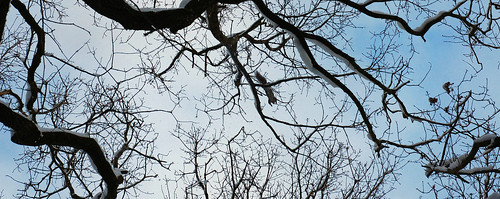Those who went to either Richard Wallis’ API session or my OPAC session at the UKSG 2009 Conference will have heard about Richard‘s Open Source Juice Project.
The project, which was launched at Code4Lib 2009, is designed to allow developers to create OPAC extensions (or, if you prefer, “bells and whistles”) that, in theory, should be product independent. This is such a genius idea!
Part of the problem with the stuff we’ve developed at Huddersfield is that we had to put an infrastructure in place around the OPAC in order to allow us to do the tweaking — an extra web server, MySQL databases, etc. It works well for us, but it’s not an easily transferable model. I’m always more than happy to share the “how we did it” but, more often than not, the actual code is too reliant on that back end infrastructure.
I need to do a bit more testing, but I’m hoping to have a HIP 3 “metadef” ready soon. The job of the metadef is to define whereabouts on the OPAC page things like the ISBN, author and title appear, and therefore will be different for every OPAC product. However, once you have a suitable metadef for your OPAC, you can start using the Juice extensions to add extra functionality — I had a quick play around last night just to prove that Juice will work with HIP 3…
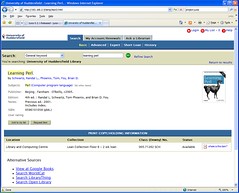
I’m not sure if this is in Richard’s plans for Juice, but it would be handy to extend the metadef to include other OPAC specific information — e.g. given an ISBN or some keywords, how do you construct a URL to trigger a search on that OPAC. That’d be really useful for embedding recommendations, etc.
Author: Dave
UKSG 2009
Far too tired to blog anything sensible, but wanted to say how much I enjoyed the UKSG 2009 Conference in Torquay 🙂
Looking at the Twitter feed (#uksg09) it sounds like the trains have been atrotious. Hope everyone eventually made it back home in one piece.
I was already full of cold before setting off and it wasn’t until this morning that my ears finally “popped” from the flight down to Exeter on Sunday… just in time for the flight back to Manchester! Once again, now all I can hear is my tinnitus 🙁 Just in case anyone was wondering, that’s why I spent most of the conference sticking my fingers in my ears and shaking my head from side to side 😀
There’s lots of photos from the event on Flickr. However, I must get myself up to a photography course, as only about 10% of all the photos I took were worth uploading. My favourite shots are these two…
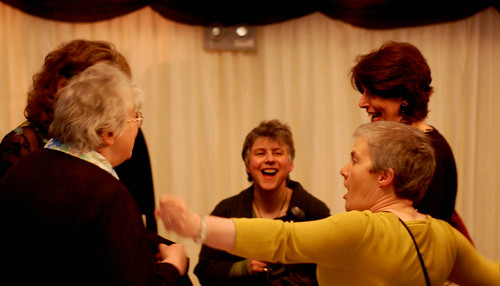
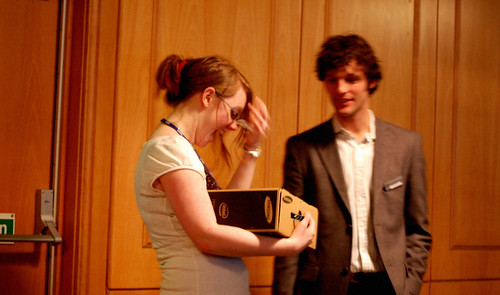
…I’ve no idea who any of the people are in the first shot (taken during the Tuesday evening drinks reception), but the second is Clare Duddy with her prize of a new Samsung netbook — many congratulations!
Not sure why, but I’ve not uploaded any photos of the duck that was starring at me through my hotel window… I’ll get photos of it uploaded tomorrow!
It was also great to meet Mike Ellis, and I’ve lost count of all the people I networked with and all of the ideas that sprang from those conversations.
Best of all, someone promised to email me a receipe for how to make limoncello — yay! 🙂
The impact of book suggestions/recommendations?
Whilst finalising my presentation for the 2009 UKSG Conference in Torquay, I thought it would be interested to dig into the circulation data to see if there was any indication that our book recommendation/suggestion services (i.e. “people who borrowed this, also borrowed…” and “we think you might be interested in…”) have had any impact on borrowing.
Here’s a graph showing the range of stock that’s being borrowed each calendar year since 2000…
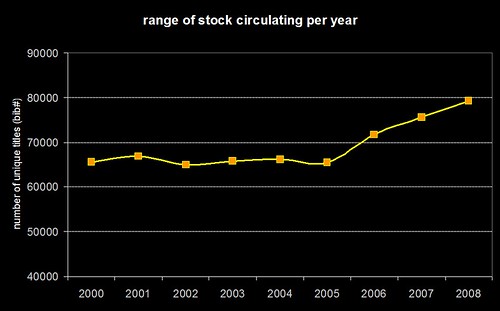
Just to be clear — the graph isn’t showing the total number of items borrowed, it’s the range of unique titles (in Horizon speak, bib numbers) that have been borrowed. If you speak SQL, then we’re talking about a “count(distinct(bib#))” type query. What I don’t have to hand is the total number of titles in stock for each year, but I’d hazard a guess that it’s been fairly constant.
You can see that from 2000 to 2005, borrowing seems to have been limited to a range of around 65,000 titles (probably driven primarily by reading lists). At the end of 2005, we introduced the “people who borrowed this, also borrowed…” suggestions and then, in early 2006, we added personalised “we think you might be interested in…” suggestions for users who’ve logged into the OPAC.
Hand on heart, I wouldn’t say that the suggestions/recommendations are wholly responsible for the sudden and continuing increase in the range of stock being borrowed, but they certainly seem to be having an impact.
Hand-in-hand with that increase, we’ve also seen a decrease in the number of times books are getting renewed (even though we’ve made renewing much easier than before, via self-issue, telephone renewals, and pre-overdue reminders). Rather than hanging onto a book and repeatedly renewing it, our students seem to be exploring our stock more widely and seeking out other titles to borrow.
So, whilst I don’t think there’s a quick any easy way of finding out what the true impact has been, I’m certainly sat here with a grin like a Cheshire cat!
Moving and Shaking
Congratulations to all the other Movers & Shakers!

Although I found out a couple of months ago that I’d made the list, I’m still really bemused by it all. Partly because it came out of the blue, but mostly because I can easily think of a dozen people who are infinitely more deserving. However, I’ll gladly try and grab my 5 minutes of fame 🙂
At the risk of doing a “Kate Winslet“, there are lots of people I’d like to thank for getting me to where I am today! Back in 2005, John Blyberg‘s innovative work at Ann Arbor gave me the confidence to start fiddling with our own OPAC. Fortunately, Dynix’s developers had created an OPAC that was fairly simple to tweak and an ILS that was easy to query, so it wasn’t an uphill struggle. (I can’t stress just how important it is that ILS vendors give their customers flexible and extensible products)
Since then, a plethora of people have continued to inspire me (in no particular order and far from complete) — Jenny Levine, Casey Durfee, Tim Spalding, Tony Hirst, Jonathan Rochkind, Helene Blowers, Casey Bisson, Kathryn Greenhill, Michael Stephens, Brian Kelly, Brendan Dawes, Richard Wallis, Phil Bradley, Stephen Abram… and, oh God, who’s the other one?!? 😉
A big “hi” to everyone who puts up with my inane waffling in the LSW chat room — you guys and girls rock! 🙂
An especially big “thank you” to my long suffering friends and colleagues at the University of Huddersfield. I’m extremely fortunate to work in a library that both innovates and inspires innovation. (Did you know Huddersfield had one of the first facetted PACs back in the 1990s? It might not be as well known as NCSUs OPAC, but Dr. Steve Pollitt‘s pioneering HIBROWSE system laid the groundwork for Endeca.)
Finally, another big “thank you” to Iman Moradi and Bryony Ramsden.
Iman’s probably the closest thing we’ve got to a “Superpatron” at Huddersfield and his boundless energy and support for the library never fails to amaze me. This year, he’s got his students playing with library data and creating visualisations — how cool is that?!
Bryony, my partner of 14 years, never seems to mind the endless hours I spend on the PC at home — for that, and many other reasons, I’m eternally grateful to her!
So, to all the unsung Movers & Shakers out there in libraries throughout the world, karma++ 🙂
QR Codes in the OPAC?
Just wondering if anyone out there is already experimenting with QR Codes in their OPAC?
We’re trying to figure out the best way of providing item location information (e.g. floor and shelfmark), so I’m interested to know if anyone has already done this.
Mash Oop North
Coming this summer…
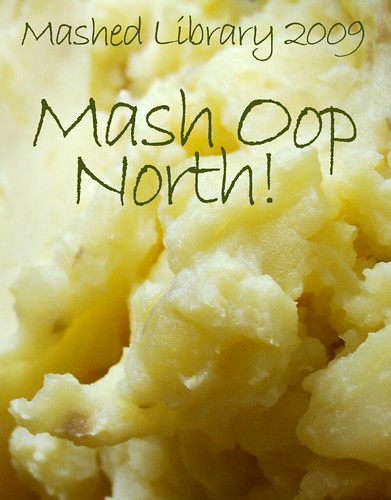
We’re hoping to fix the date soon, but it’s likely to be on or around Tuesday July 7th at the University of Huddersfield.
If it is July 7th, then we’d be able to celebrate:
…that both events occurred on July 7th is not a coincidence 😉
(mashed potato courtesy of jslander)
OPAC Survey 2009
Almost 2 years ago, 729 of you generously took time to fill out a survey about OPACs (archived here). You can find a selection of blog posts about the results here.
I’m pleased to say that a follow-up survey is now being conducted by Bowker and I’d encourage as many of you as possible to fill it in. For every 100 responses, Bowker will donate a gift of schoolbooks to deprived children via the Oxfam Unwrapped scheme 🙂

I think in 2007 we managed to gather enough statistical evidence to say “OPACs suck” and it’ll be interesting to see how much has changed in the last couple of years! Quite a few of you were hoping to implement new features in your OPACs …did it happen? …did those features meet your expectations?
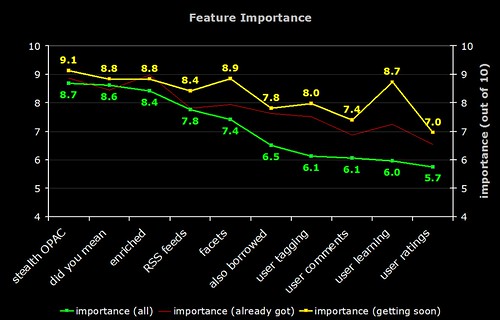
Mashed Libraries — “Mash Oop North”?
I’ll try and make some time to blog about the excellent dev8D event, but on Thursday morning I had a chat with Owen Stephens about running a Mashed Libraries event in Yorkshire.
Earlier on in the week, the name “Mash Oop North” sprang into my head[1]. With a name like that, it’d be rude not to run an event 😀

(Mash and Gravy by chotda)
So, would anyone be interested in attending an event hosted in Huddersfield (or perhaps somewhere else in Yorkshire)? I’ve posted a comment on the Mashed Libraries forum with more details about travel links to Huddersfield. Please post a comment here or on the forum to say “yay” or “nay”!
[1] “oop north” is fairly common slang for “up north” (i.e. the North of England), as in “it’s grim oop north“
JISC Developer Happiness Days (dev8D)
For my sins, I’m going to be facilitating the OPAC Community Meeting at the JISC Developer Happiness Days event in London next week.
Although we’ve got “OPAC” in the name, I think the session should include anything to do with library catalogues, library usage data, MARC records, federated search engines, revelancy ranking, facets, etc
We’d like to kick the session of with several “Minute Madness” talks. If you’re considering coming along to the session, and you meet any of the following criteria, please add your name to wiki!
- you’ve done something cool with your OPAC
- you’d like to do something cool with your OPAC
- you’d like a soapbox to rant about how much your OPAC sucks
- you’d just like an opportunity to rant about something
- you’re in need of a new soapbox
- you’ve got a box of soap
- you’re in need of a box of soap
- you’re intending to steal all of the soap from your hotel room
- you’d like to steal all of the soap from your hotel room, but you need to a box to put it all in
Remember — if you don’t volunteer, then we’ll need to unleash the JISC Press Gang 😉
Hopefully we’ll then be able to use the topics raised by the lightning talks to help shape the rest of the session.
It’s raining squirrels
Squirrels falling out of the sky isn’t something that’s unheard of in Huddersfield — see this BBC News story about an inventor who suffered whiplash from a falling squirrel — but I’d not seen it happen until yesterday.
Late yesterday afternoon, we ventured out into the snow and had a little wander through the local woods. I’d taken my camera with me and, not too far into the woods, I took this photo of the path…
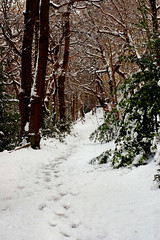
My camera’s set up to do a “burst” of shots, so it automatically took another 3 photos in quick succession. Just as I was taking the first photo, I was aware of a noise in the tree tops — what I didn’t realise was it was the sound of a squirrel falling 😀
The next shot caught the squirrel in mid-fall, although it’s just a blur in the middle of the frame…
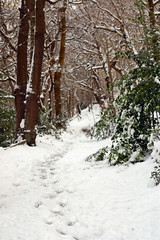
…it had a soft landing in about 9 inches of snow…
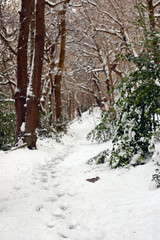
…and then headed straight back up the nearest tree…
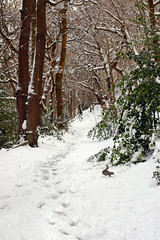
…within seconds it was leaping around the tree tops like nothing had happened…
